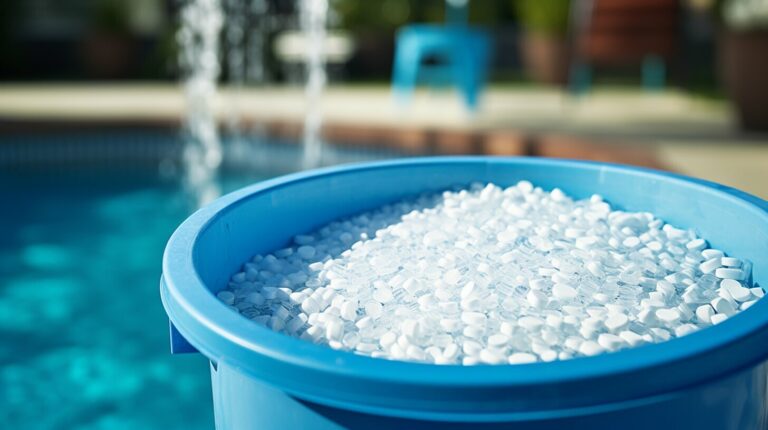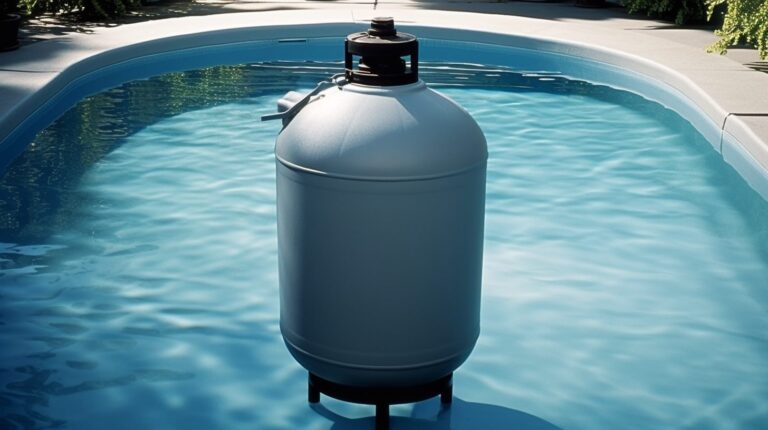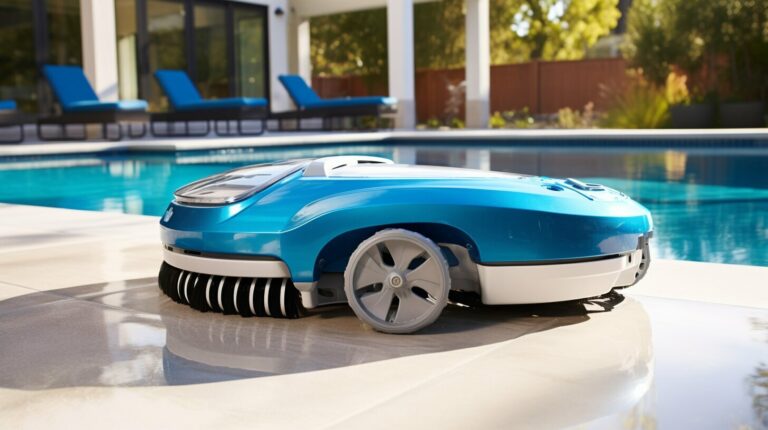How To Clean Glass Pool Tile: 2023 Maintenance Guide
How To Clean Glass Pool Tile
How to clean glass pool tile: Having a pool can be a joy, but keeping those glass tiles spotless? That’s another story. Glass pool tiles, while beautiful, are prone to unsightly buildups like dirt and calcium deposits.
This article will guide you through various methods of cleaning your glass pool tiles effectively and safely. Let’s dive in and make your pool shine!
Key Takeaways
- Glass pool tiles can accumulate common buildup such as calcium deposits, grime, dirt, and scale. Effective cleaning methods include using vinegar solutions or stain erasers for calcium deposits, regular brushing and appropriate tile cleaning products for grime and dirt, and muriatic acid (with caution) or pressure washing (with caution) for scale.
- Vinegar is a popular and effective solution for cleaning glass pool tiles. Mixing equal parts vinegar with water in a spray bottle, spraying the solution onto the tiles, letting it sit, scrubbing gently, and rinsing thoroughly can help remove calcium deposits.
- Tile cleaning products specifically designed for pool tiles effectively remove calcium buildup, grime, and stains from glass pool tiles. Stain erasers like melamine sponges can also be used to target tough stains. Additionally, homemade solutions like vinegar-water mixtures or baking soda paste can be effective.
- Muriatic acid should be used with caution due to its corrosive nature. It should always be diluted before use and tested on a small area first. Safety precautions, such as wearing protective gear, should be taken during use.
Common Buildup on Glass Pool Tiles
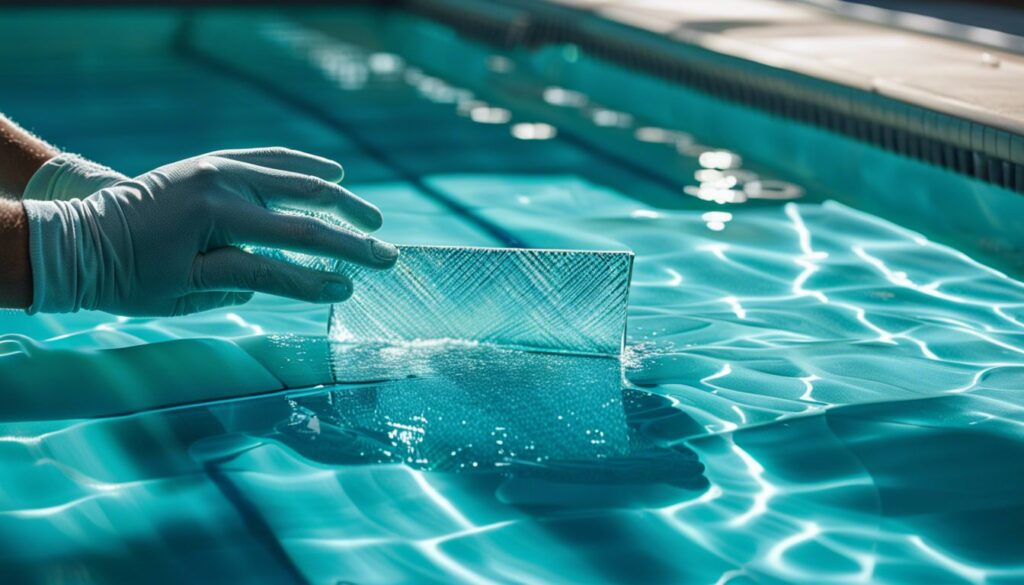
Common buildup on glass pool tiles includes calcium deposits, grime and dirt, and scale.
Calcium deposits
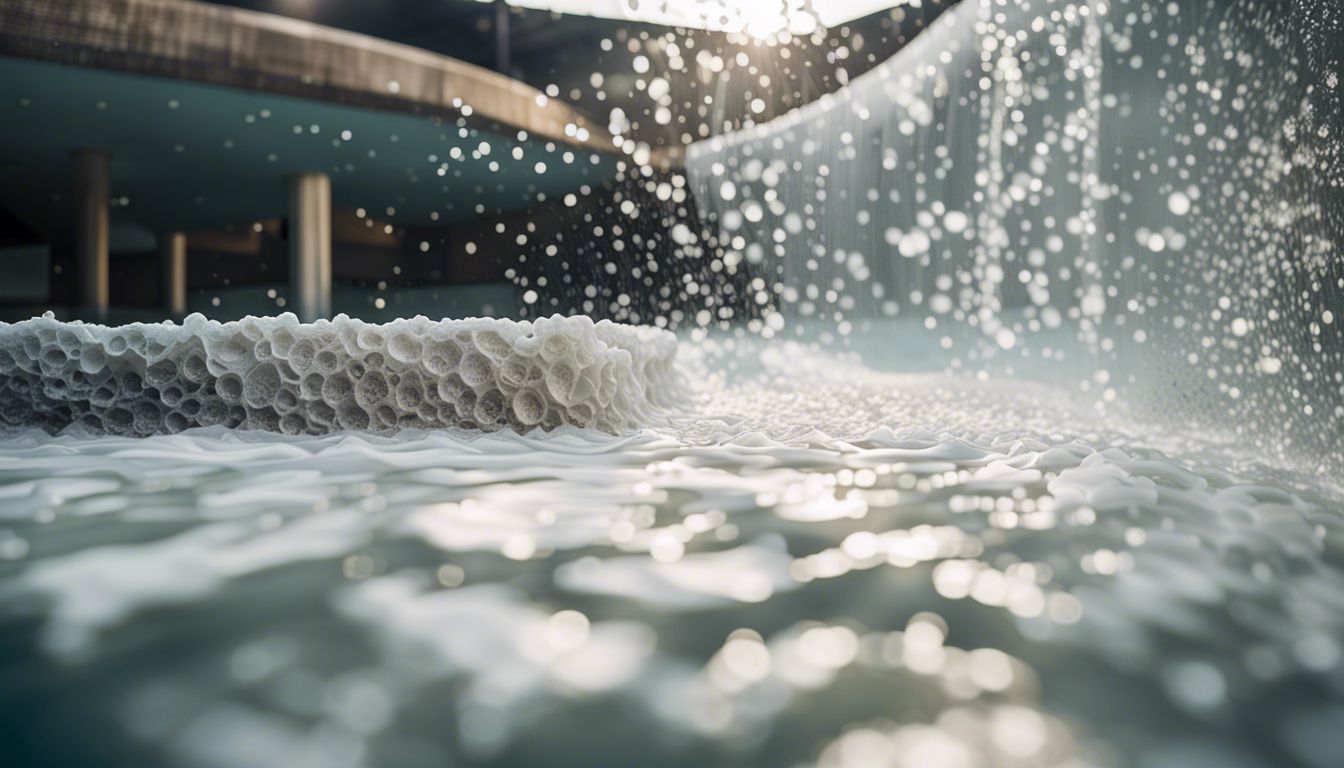 Calcium deposits, often identified as white or grayish scaly accumulations, can be a stubborn nuisance for pool owners. They’re formed when the water in your pool has high calcium levels and low pH, causing calcium to precipitate and stick to the tile surface.
Calcium deposits, often identified as white or grayish scaly accumulations, can be a stubborn nuisance for pool owners. They’re formed when the water in your pool has high calcium levels and low pH, causing calcium to precipitate and stick to the tile surface.
Notably, these unsightly buildups typically accumulate on waterline tiles due to evaporation. Although harmless, they make your beautiful glass pool tiles look dull and neglected. Effective removal methods include using vinegar – a natural alternative that dissolves these deposits – or stain erasers made from soft abrasives specifically designed for this purpose.
Despite their labor-intensive use, turning to pumice stones for toughened deposits like calcium silicate might be necessary.
Grime and dirt
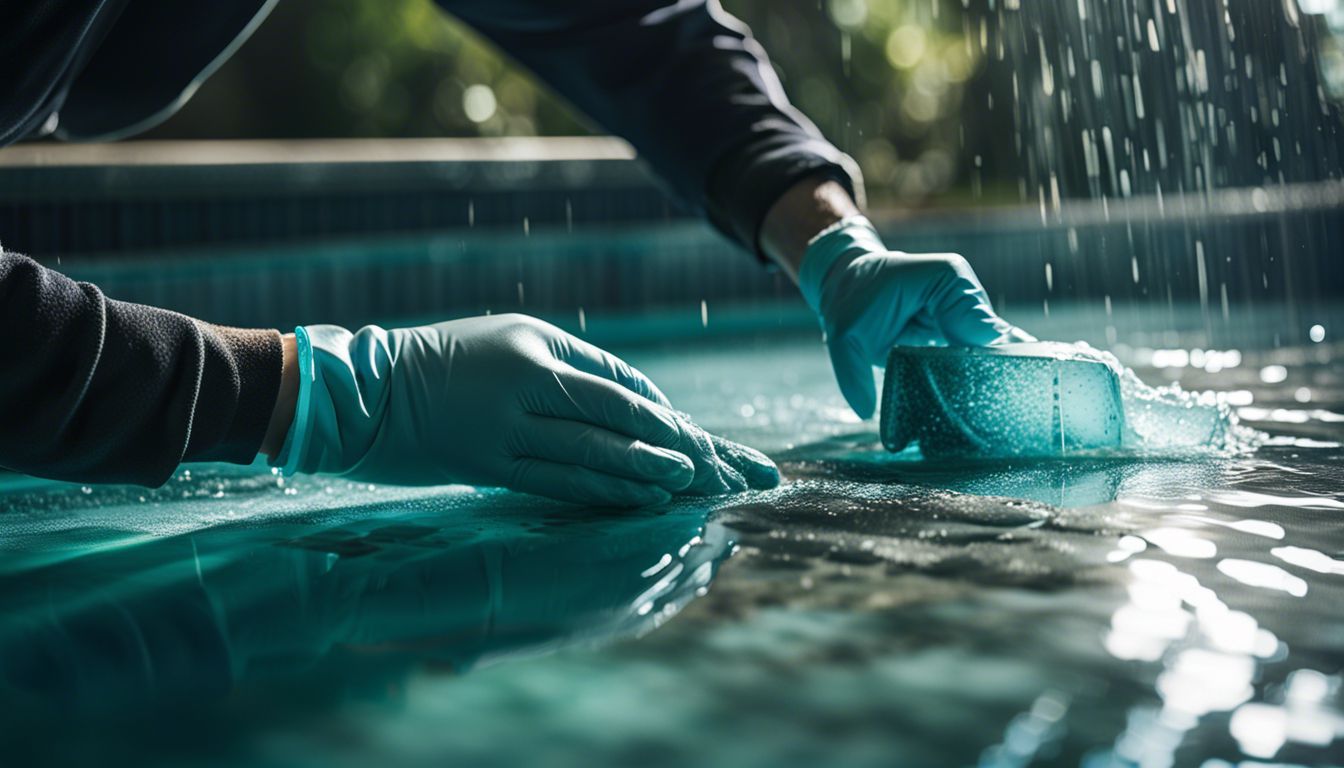 Grime and dirt often get onto your glass pool tiles, resulting in an unsightly mess. The debris can be a real eyesore if not dealt with promptly, from organic materials like grass clippings to mineral buildup.
Grime and dirt often get onto your glass pool tiles, resulting in an unsightly mess. The debris can be a real eyesore if not dealt with promptly, from organic materials like grass clippings to mineral buildup.
Most of this accumulation happens at the waterline and bottom of the pool, where it’s most noticeable. Regular pool cleaning using effective tools such as a stiff brush and appropriate tile cleaning products can help keep these areas spotless.
However, dealing with stubborn stains that resist conventional brushing may require more elbow grease or advanced techniques. While some might recommend scrubbing with a pumice stone or baking soda, extreme caution is advised to avoid scratching your delicate glass tiles.
A safer alternative could be pressure washing or employing professional services for the best results. Lastly, maintaining optimal levels of pool chemicals is integral in preventing grime formation on glass pool tiles from commonplace sources like sunscreen residue and body oils.
Scale
 Scale buildup on your glass pool tiles can be a real nuisance. Its official name is calcium silicate scaling, and it’s challenging to remove. Usually caused by imbalances in your water – think high total hardness, unregulated pH level, or elevated alkalinity – this chalky white substance can quickly make your attractive pool look dirty and poorly maintained.
Scale buildup on your glass pool tiles can be a real nuisance. Its official name is calcium silicate scaling, and it’s challenging to remove. Usually caused by imbalances in your water – think high total hardness, unregulated pH level, or elevated alkalinity – this chalky white substance can quickly make your attractive pool look dirty and poorly maintained.
It’s not enough to scrub with any old brush; you need one specifically designed for your swimming pool. Some homeowners turn to pumice stones for tackling stubborn stains but remember: they’re best left for concrete surfaces or extremely tough deposits.
Alternatively, vinegar offers a cost-effective solution that’s also non-toxic. You can even use baking soda as an effective agent in the cleaning process! With some elbow grease and the right cleaning solutions applied in small sections at a time, you’ll have clean pool tile before the next swim season rolls around!
How To Clean Glass Pool Tile: Best Methods
Vinegar solution
Vinegar is a popular and effective solution for cleaning glass pool tiles. Here’s how you can use vinegar to clean your pool tiles:
- Mix white or apple cider vinegar with water in a spray bottle.
- Spray the vinegar solution onto the glass pool tiles, focusing on areas with calcium deposits or scale buildup.
- Let the vinegar solution sit on the tiles for a few minutes to penetrate and break down the buildup.
- Scrub the tiles gently with a soft-bristle brush or a sponge to remove the loosened deposits.
- Rinse the tiles thoroughly with clean water to remove any remaining vinegar residue.
Tile cleaning products and stain erasers
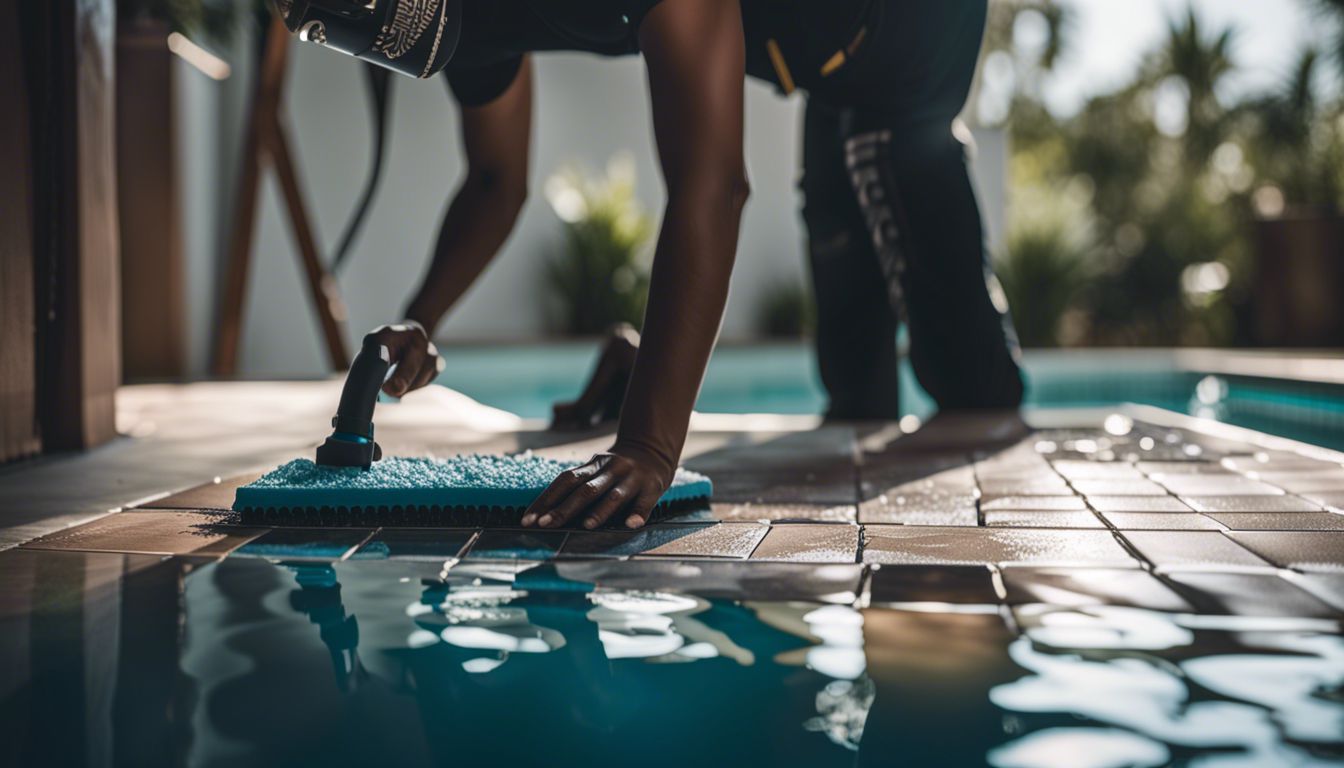 Cleaning products specifically designed for pool tiles are available in the market. These products are formulated to effectively remove calcium buildup, grime, and stains from glass pool tiles. Here are some options for tile cleaning products and stain erasers that can help you keep your glass pool tiles looking clean and sparkling:
Cleaning products specifically designed for pool tiles are available in the market. These products are formulated to effectively remove calcium buildup, grime, and stains from glass pool tiles. Here are some options for tile cleaning products and stain erasers that can help you keep your glass pool tiles looking clean and sparkling:
- Pool Tile Cleaner: Look for a tile cleaner specifically labeled for use on pool tiles. These cleaners are formulated to break down mineral deposits, calcium carbonate, and other stubborn stains without damaging the tile surface.
- Stain Erasers: Soft abrasives like melamine sponges or stain erasers can target tough stains on pool tiles. Gently scrub the stained area using a circular motion until the stain is lifted.
- Vinegar Solution: A mixture of water and vinegar can also be an effective homemade cleaning solution for glass pool tiles. Combine equal parts of water and vinegar in a spray bottle, then spray onto the tiles and scrub with a soft-bristle brush.
- Baking Soda Paste: You can create a paste by combining baking soda with water or dishwashing liquid. Apply the paste to the stained area and gently scrub with a soft-bristle brush until the stain is removed.
Muriatic acid (with caution)
Muriatic acid can be an effective solution for removing stubborn stains and calcium deposits from glass pool tiles. However, it is important to use this acid cautiously due to its corrosive nature. Here are some key points to keep in mind when using muriatic acid for cleaning:
- Wear protective clothing: When handling muriatic acid, protecting your skin and eyes is crucial. Wear gloves, goggles, and other appropriate protective gear to prevent any potential contact with the acid.
- Dilute the acid: Muriatic acid should always be diluted before use. Mix one part muriatic acid with four parts water in a well-ventilated area. Avoid adding water to the acid, as it can cause a dangerous reaction.
- Test on a small area: Before applying the diluted solution to the entire pool tile surface, test it on a small inconspicuous area first. This will help you determine if the acid mixture is safe for your specific type of glass tile.
- Apply in a circular motion: Using a soft brush or sponge, apply the diluted muriatic acid solution to the stained areas of the glass pool tiles. Scrub gently in a circular motion to loosen and remove the buildup.
- Rinse thoroughly: Once you’ve scrubbed the tiles with muriatic acid, rinse them thoroughly with clean water. This will remove any remaining residue from the cleaning process.
- Take safety precautions: Take appropriate safety precautions during and after cleaning with muriatic acid. Avoid inhaling fumes by working in a well-ventilated area or using respiratory protection if necessary.
Pressure washing (with caution)
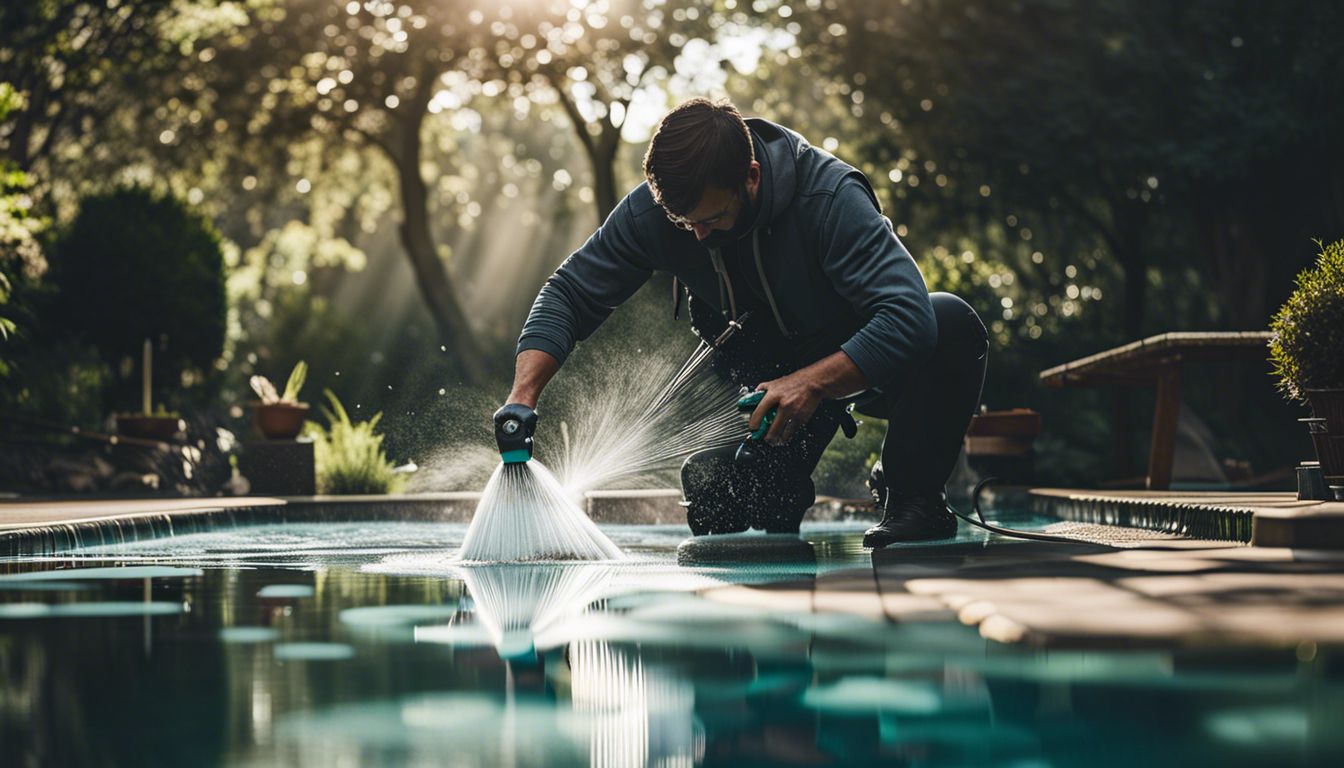 Pressure washing is an effective method for cleaning glass pool tiles. Here are some important tips to keep in mind when using pressure washing to clean your pool tiles:
Pressure washing is an effective method for cleaning glass pool tiles. Here are some important tips to keep in mind when using pressure washing to clean your pool tiles:
- Adjust the pressure: Set the pressure washer to a low or medium setting, typically between 1200 and 2600 PSI, to avoid damaging the delicate glass tile surface.
- Use a wide-angle nozzle: Opt for a wide-angle nozzle attachment on your pressure washer to cover a larger area and prevent concentrated pressure on one spot.
- Maintain a safe distance: Stand at least 12 inches from the tiles while pressure washing to prevent accidental damage.
- Start with gentle sweeps: Begin by gently sweeping the pressure washer wand across the tiles in a side-to-side motion. Gradually increase the pressure if needed, but always test on a small area first.
- Work in sections: Divide your pool into smaller sections and clean one section at a time, ensuring thorough coverage without rushing through the process.
- Watch out for grout damage: Be cautious when directing the pressure washer towards grout lines, as high-pressure water can dislodge or damage grout. Keep the nozzle toward the tile surface rather than directly at the grout lines.
- Protect yourself and your surroundings: Wear protective clothing like goggles and gloves to shield yourself from water splashes and debris. Cover nearby plants or delicate surfaces that could be affected by overspray or debris.
 There are several methods for cleaning glass pool tiles, including using a vinegar solution, tile cleaning products and stain erasers, muriatic acid (with caution), pressure washing (with caution), or opting for a professional pool maintenance appointment.
There are several methods for cleaning glass pool tiles, including using a vinegar solution, tile cleaning products and stain erasers, muriatic acid (with caution), pressure washing (with caution), or opting for a professional pool maintenance appointment.
A professional pool maintenance appointment
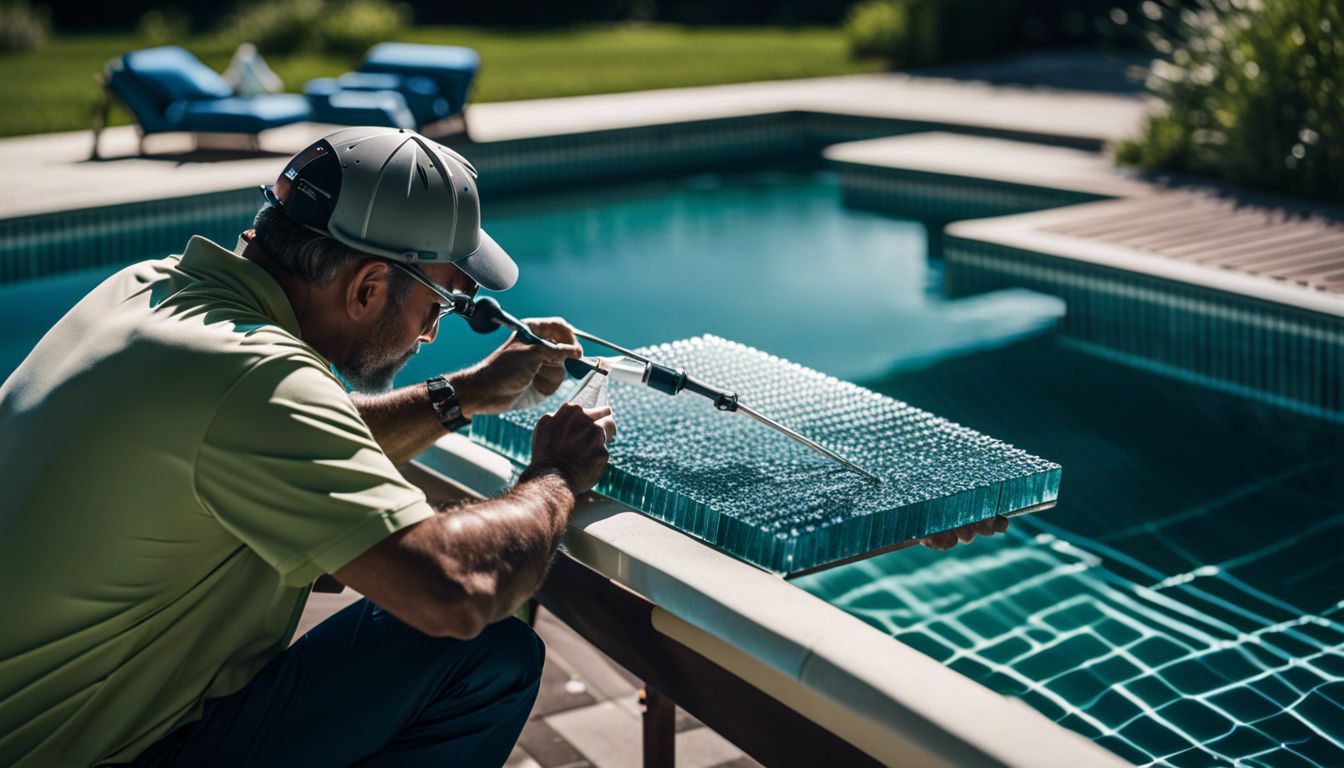
- Consider scheduling a professional pool maintenance appointment to ensure your glass pool tiles are thoroughly cleaned.
- Pool maintenance professionals have the knowledge and experience to effectively remove buildup and stains from your pool tiles.
- They have access to specialized cleaning equipment and products that can provide optimal results.
- Professionals can identify any underlying issues or damage to your pool tiles that may require additional attention or repairs.
- Hiring a professional saves you time and effort, allowing you to enjoy your clean pool without cleaning it yourself.
Safety Tips for Cleaning Glass Pool Tiles
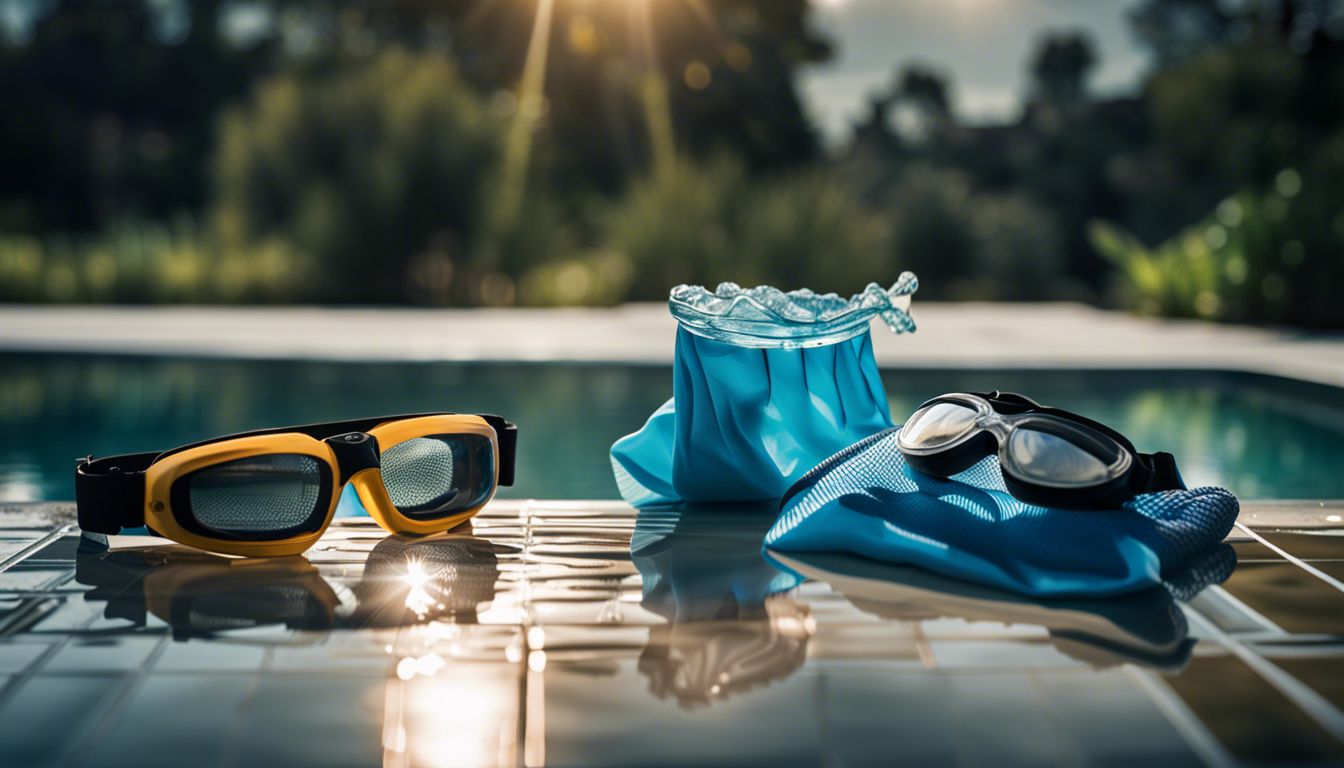 When cleaning glass pool tiles, it is important to use gloves and eye protection for safety.
When cleaning glass pool tiles, it is important to use gloves and eye protection for safety.
Use gloves and eye protection
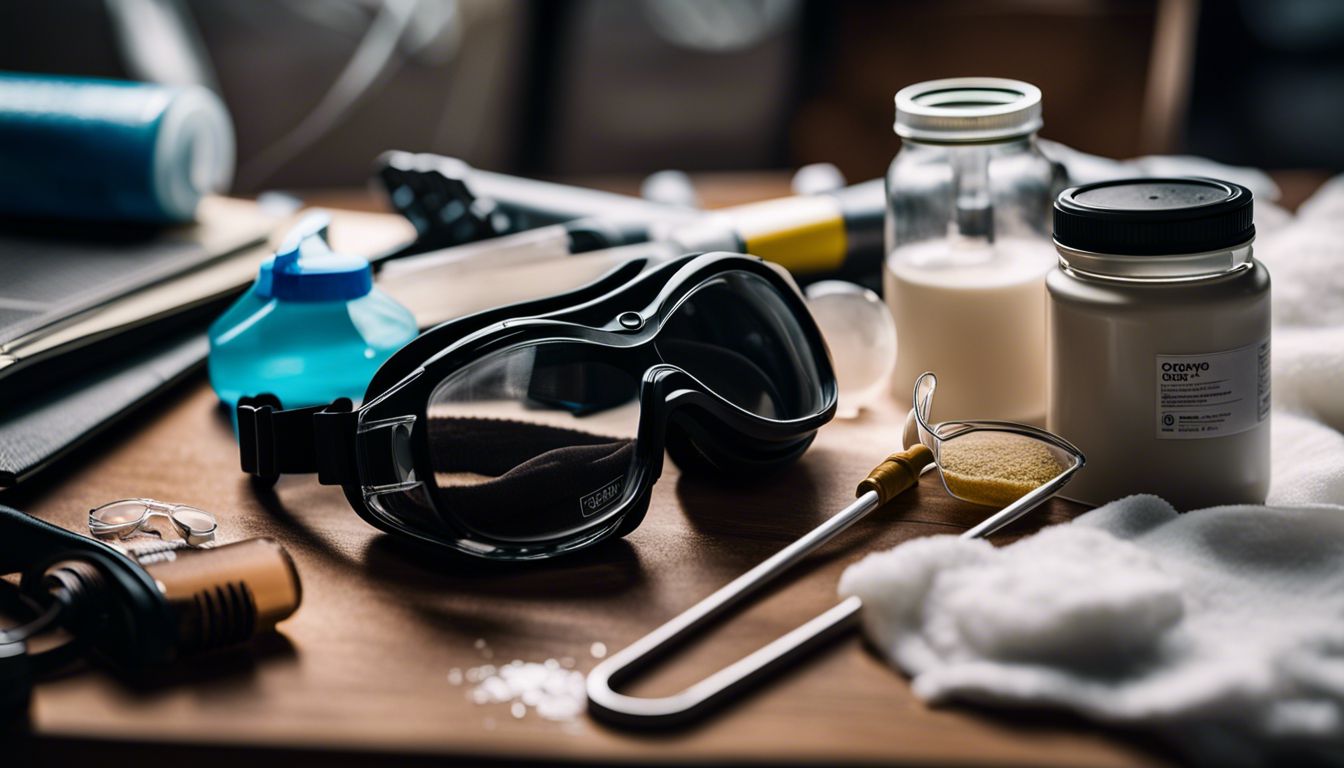
- It is crucial to prioritize your safety while cleaning glass pool tiles.
- Always wear protective gloves and eye protection to prevent any injuries or irritation from cleaning chemicals.
- The gloves will protect your hands from harsh chemicals and prevent skin irritation.
- Eye protection, such as safety goggles or glasses, will shield your eyes from any splashes or debris during cleaning.
- Additionally, wearing proper attire, including closed – toe shoes and protective clothing, can further ensure your safety.
Avoid mixing cleaning chemicals
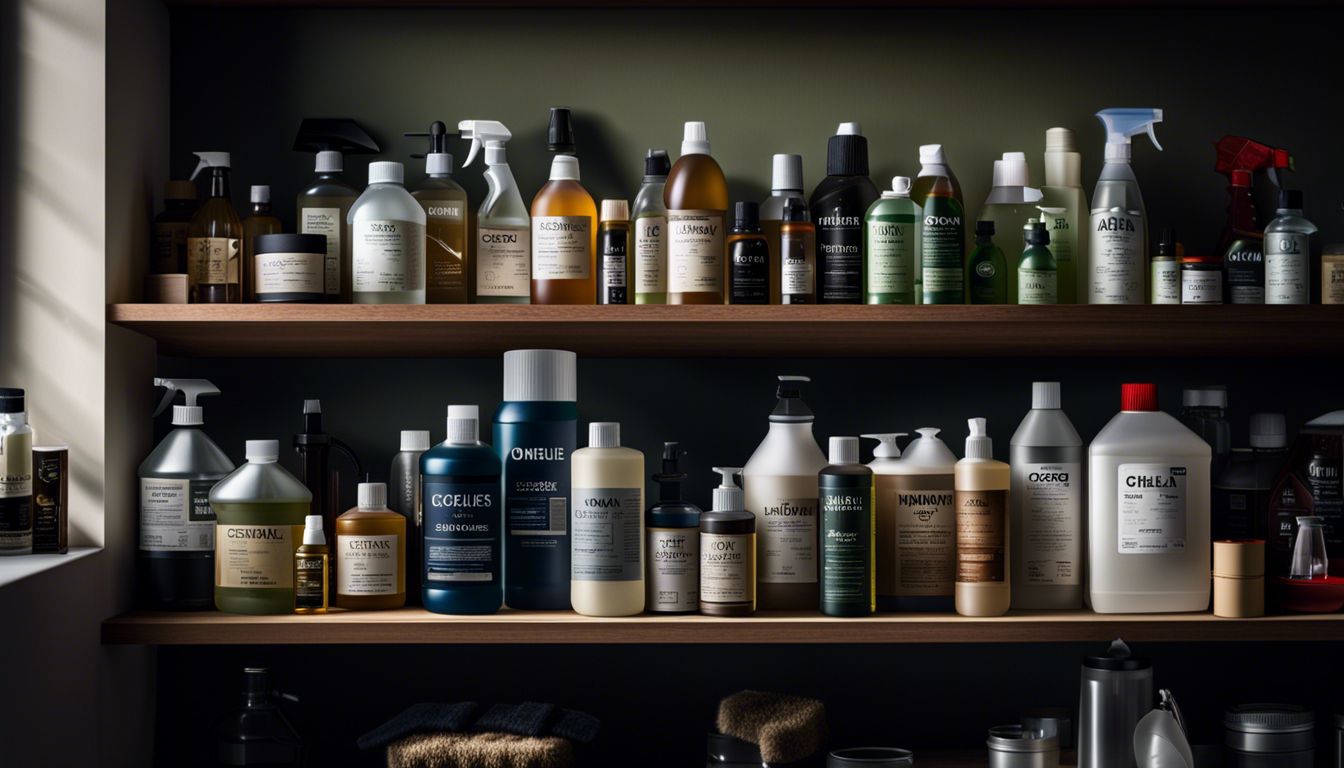 It is important to avoid mixing cleaning chemicals when cleaning glass pool tiles. Mixing household chemical cleaners can lead to dangerous chemical reactions that produce harmful fumes. Here are some reasons why you should avoid mixing cleaning chemicals:
It is important to avoid mixing cleaning chemicals when cleaning glass pool tiles. Mixing household chemical cleaners can lead to dangerous chemical reactions that produce harmful fumes. Here are some reasons why you should avoid mixing cleaning chemicals:
- Harmful fumes: Mixing bleach and vinegar, for example, can create chlorine gas, which can cause coughing, breathing problems, and irritation to the eyes.
- Chemical reactions: Some toilet bowl cleaners, glass cleaners, and other household products contain bleach, ammonia, or acids that can be harmful if mixed. It is crucial to read the labels carefully and avoid using them together.
- Safety concerns: Mixing cleaning products can lead to harmful chemical reactions and should be avoided to protect yourself from potential health hazards.
- Proper cleaning techniques: Instead of mixing cleaning chemicals, use a gentle, pH-neutral cleaner specifically designed for glass pool tiles. This will ensure effective cleaning without any potential risks.
Properly ventilate the area
Properly ventilating the area is crucial when cleaning glass pool tiles. Here’s why:
- Ventilation helps to release any fumes and chemicals that may be present during the cleaning process, creating a safer environment for both you and your pool.
- Adequate airflow helps to prevent the buildup of potentially harmful gases, such as chlorine gas or muriatic acid fumes.
- It reduces the risk of breathing in any irritants or allergens that can be released during the cleaning process.
- Ventilating the area also helps to minimize moisture accumulation, preventing mold or mildew growth in and around your pool.
Follow manufacturer instructions for cleaning products
 It is important to follow the manufacturer’s instructions when using cleaning products on your glass pool tiles. This will ensure that you use the product correctly and safely, and achieve the best results. Here are some reasons why it is important to follow the manufacturer’s instructions:
It is important to follow the manufacturer’s instructions when using cleaning products on your glass pool tiles. This will ensure that you use the product correctly and safely, and achieve the best results. Here are some reasons why it is important to follow the manufacturer’s instructions:
- Safety: Cleaning products may contain chemicals that can be harmful if not used properly. Following the instructions will help you understand any safety precautions or protective measures you need to take while using the product.
- Effectiveness: The manufacturer’s instructions will provide guidance on how to use the product for optimal results. Using a product incorrectly or in the wrong concentration may not effectively clean your glass pool tiles.
- Compatibility: Different types of pool tiles may require different cleaning methods or solutions. By following the manufacturer’s instructions, you can ensure that you are using a cleaning product that is safe and suitable for your specific type of glass pool tile.
- Avoid damage: Some cleaning products may be too harsh for certain glass pool tiles, leading to discoloration or damage. The manufacturer’s instructions will help you choose a gentle product for your tile surface.
- Warranty protection: If your glass pool tiles are still under warranty, not following the manufacturer’s instructions could void the warranty. It is always best to adhere to their recommendations to avoid any potential issues in case of a claim.
Tips for Maintaining Clean Glass Pool Tiles
 Regular brushing and cleaning is essential for maintaining clean glass pool tiles. Remove leaves and debris promptly, use a soft-bristle brush for gentle scrubbing, and avoid abrasive materials like pumice stones.
Regular brushing and cleaning is essential for maintaining clean glass pool tiles. Remove leaves and debris promptly, use a soft-bristle brush for gentle scrubbing, and avoid abrasive materials like pumice stones.
Consider using natural cleaners like vinegar and baking soda to keep your glass pool tiles looking their best.
Regular brushing and cleaning
Regular brushing and cleaning are essential for maintaining clean glass pool tiles. Here are some tips to help you keep your pool tiles in great condition:
- Brush the tiles regularly: Regular brushing helps prevent the buildup of dirt, grime, and calcium deposits on the glass pool tiles.
- Use a soft-bristle brush: Choose a brush with soft bristles to avoid scratching or damaging the surface of the tiles.
- Brush in circular motions: When brushing the tiles, use circular motions to effectively remove any dirt or debris that may have accumulated.
- Remove leaves and debris promptly: Leaves, twigs, or other debris that fall into the pool can leave stains on the tiles if left for too long. Remove them promptly to prevent staining.
- Consider using natural cleaners: Vinegar and baking soda are effective natural cleaners for glass pool tiles. Mix equal parts vinegar and water in a spray bottle, spray it onto the tiles, and scrub gently with a soft brush.
- Avoid abrasive materials: Avoid using abrasive materials like pumice stones as they can scratch or damage the glass surface of the pool tiles.
- Seek professional help if needed: If you’re unsure about how to properly clean your glass pool tiles or if there are stubborn stains that you can’t remove, consider contacting a professional pool maintenance service for assistance.
Remove leaves and debris promptly
Leaves and debris can quickly accumulate on your glass pool tiles, making them look dirty and neglected. To keep your pool looking pristine, it’s important to remove leaves and debris promptly. Here are some tips for doing so:
- Skim the water surface: Use a skimmer net or pool vacuum to skim the water surface and remove any floating leaves or debris. This will prevent them from settling on the pool tiles.
- Vacuum the bottom of the pool: Use a pool vacuum to remove any leaves or debris that have sunk to the bottom of the pool. Regular vacuuming will help prevent build-up on the tiles.
- Brush the tiles regularly: Use a soft-bristle brush to gently scrub the tiles and dislodge any stubborn debris. Be sure to brush in circular motions to effectively clean all areas.
- Use a leaf blower: If you have a large amount of leaves on your pool deck or surrounding area, use a leaf blower to gather them up and dispose of them properly. This will prevent them from being blown into the pool and onto the tiles.
- Trim nearby trees and plants: If you have trees or plants near your pool, make sure to trim any overhanging branches or foliage that may drop leaves into the water. Keeping vegetation away from the pool area will reduce maintenance needs.
Use a soft-bristle brush for gentle scrubbing
- Gently scrubbing glass pool tiles with a soft – bristle brush helps to avoid scratching the surface.
- Avoid using harsh or abrasive materials like pumice stones on the tiles.
- A soft – bristle brush is suitable for cleaning glass, ceramic, or porcelain tiles.
- Scrubbing the tiles in a circular motion with a soft brush helps to remove mineral deposits and grime effectively.
- Regularly using a soft – bristle brush for gentle scrubbing helps maintain clean and beautiful glass pool tiles.
- It is important to rinse the tiles with clean water after scrubbing them with a soft – bristle brush.
Avoid abrasive materials like pumice stones
- Abrasive materials like pumice stones can cause damage to glass pool tiles.
- Pumice stones are not recommended for use on vinyl or fiberglass pools.
- Using pumice stones on concrete pools can effectively remove calcium buildup.
- Wet pumice stones are safe to use on pool tiles, but caution should be exercised to avoid scratching the tile surface.
- There are more gentle and effective alternatives to pumice stones for cleaning glass pool tiles, such as using vinegar solutions or tile cleaning products.
Consider using natural cleaners like vinegar and baking soda
- Vinegar and baking soda are excellent natural cleaners for maintaining clean glass pool tiles.
- Mix vinegar with water in a spray bottle to create a cleaning solution.
- Apply the vinegar solution to the glass pool tiles and scrub gently with a soft – bristle brush.
- Baking soda can also be used as a natural cleaner for pool tiles.
- Make a paste by mixing baking soda with water, and then apply it to the tiles using a sponge or soft brush.
- Scrub the tiles in circular motions to remove dirt, grime, and calcium deposits.
- Rinse the tiles thoroughly with water after cleaning.
- Using natural cleaners like vinegar and baking soda is a cost-effective and eco-friendly option for pool owners.
Conclusion
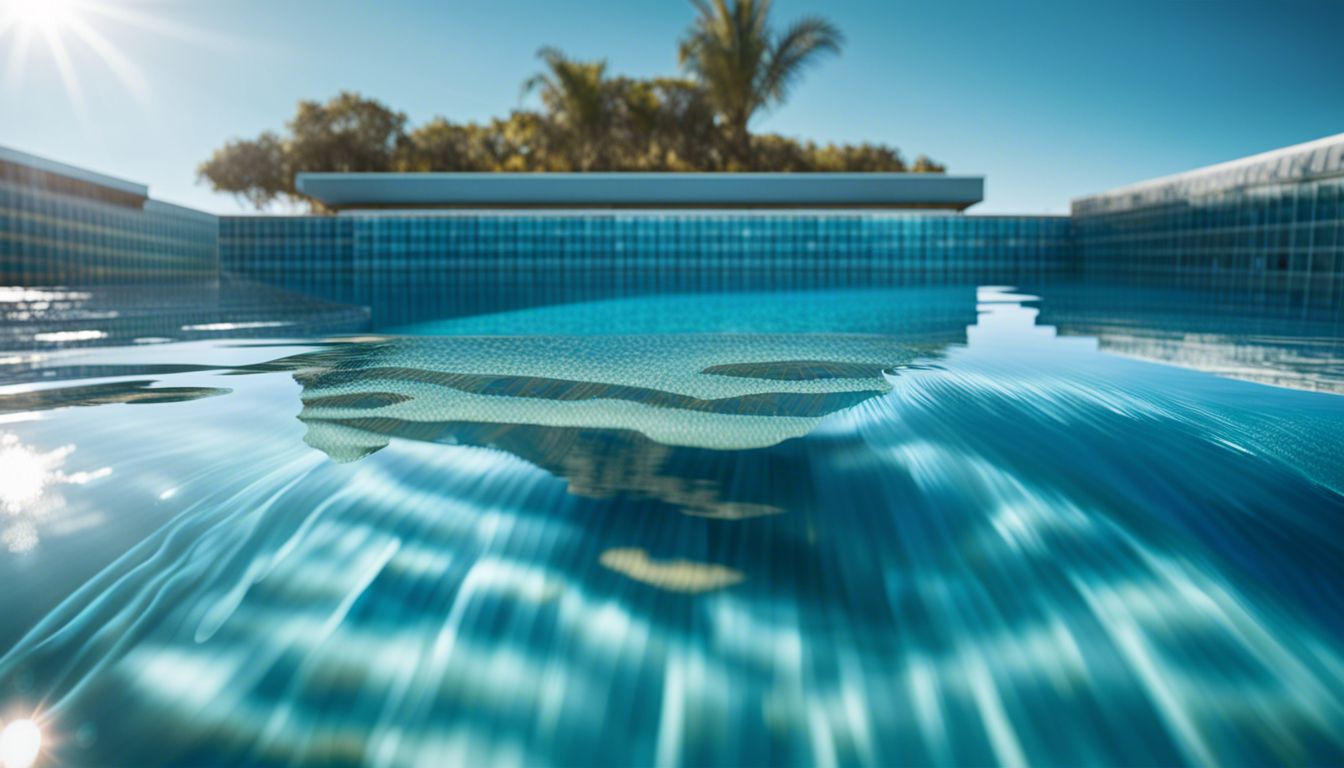 In conclusion, maintaining clean glass pool tiles is essential for the overall appearance and longevity of your pool. By regularly cleaning and removing buildup, such as calcium deposits and grime, you can ensure that your pool remains sparkling and inviting for years to come.
In conclusion, maintaining clean glass pool tiles is essential for the overall appearance and longevity of your pool. By regularly cleaning and removing buildup, such as calcium deposits and grime, you can ensure that your pool remains sparkling and inviting for years to come.
Utilizing safe cleaning methods, like vinegar solutions or tile cleaning products, will help protect the delicate surface of the glass tiles. Remember to always prioritize safety by wearing protective gear and following manufacturer instructions.
With proper care and maintenance, you can enjoy a beautiful pool that shines with every swim.
What is the Best Way to Clean Glass Pool Tile?
The top method to clean glass pool tile involves a mixture of warm pool water and mild dish soap, or even a glass-specific cleaner. Take a soft brush or sponge to gently scrub the tiles. Following the cleaning, a thorough rinse with water is mandatory.
Can I Use Abrasive Cleaners on Glass Pool Tile?
Abrasive cleaners can cause detrimental effects on glass pool tile. These cleaners could potentially scratch or damage the pool walls. To avoid this, gentle cleaning solutions and non-abrasive tools should be the go-to options.
How Often Should I Clean My Glass Pool Tile?
Factors such as usage, weather conditions, and the surrounding environment determine the cleaning frequency of your glass pool tile. However, as a rule of thumb, you should aim to clean your pool tiles at least once every few weeks. It’s also a good idea to clean whenever visible buildup or grime appears.
Are There Any Additional Maintenance Steps I Should Take for My Glass Pool Tile?
Indeed, apart from cleaning, you should also regularly check your glass pool tile for any signs of damage or cracks. It’s crucial to repair or replace any damaged tiles promptly. This can go a long way in ensuring the longevity and safety of your swimming pool area.
What’s the Best Way to Deal with Stagnant Water in an Inground Pool?
Stagnant water in an inground pool could breed bacteria and algae, ruining your pool’s look and safety. For best results, consider using a submersible pump to remove excess water.
What Are the Dangers of Draining the Entire Pool?
Draining the entire pool may seem like a great idea, especially for deep cleaning. But beware. The weight of the water inside an inground pool, such as a concrete pool or a fiberglass pool, helps to counteract the hydrostatic pressure from groundwater. If you empty the pool, the groundwater could cause the pool shell to pop out of the ground, causing serious damage.
How Can I Safeguard My Pool During Winter Months?
During the cold weather, you should winterize your pool to prevent unnecessary damage. This includes covering your pool with a pool cover, adding appropriate winterizing chemicals, and lowering the water to the skimmer level.
How Often Should I Inspect My Pool Lights?
As a pool owner, it’s crucial to check your pool lights at least once a year. Doing this helps identify any potential issues early on, preventing more significant problems down the line.



